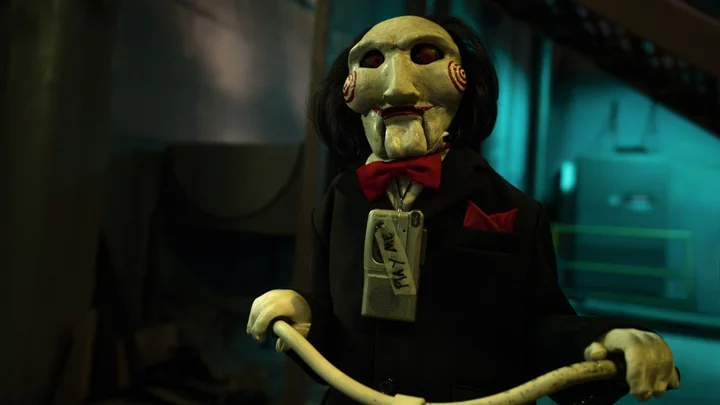"We made this for the fans!" is a defense frequently trotted out in the face of critiques of franchise films. However, there's perhaps no more apt a description of Saw X than something crafted specifically for longtime viewers. Which is not to say that it's impenetrable to outsiders — though 10 entries in, you probably know whether or not Saw is for you — but rather, that it's built on the kind of meta-textual adoration that only long-time devotees could have for a twisted serial killer who once audited freshman Philosophy 101. Saw X isn't just good; it's good in a way that none of the other Saw films have been. This doesn't mean it ranks above the best of them per se, but rather that it appears alongside them in a parallel column, a differentiation in style and substance that become necessary in order to discuss it at all.
SEE ALSO: How to watch every single "Saw" movie before the release of "Saw X"It's fun and silly, and it'll make you squirm in your seat, but it also scratches that particular Saw fandom itch: filling in gaps in the backstory that you didn't even know existed. It's a standalone entry of sorts, as it takes place somewhere between the first and third movies, but it also builds on relationships that once formed the framework for previous traps and twists. In the process, it makes the moralizing, bloodthirsty Jigsaw/John Kramer (Tobin Bell) not just the protagonist for the first time but also, in some ways, an out-and-out hero in what is essentially a cancer melodrama that explodes into torture porn vigilantism.
Granted, a heroic Jigsaw can never be fully packaged and sold to rational viewers, but this is something of which even the movie seems sharply aware. So, rather than trying to reconcile his viciousness with the film's deific framing, it simply…doesn't. There's no cognitive dissonance involved — no one is going to come away from Saw X feeling remotely conflicted — but rather, it features a cinematic dissonance with which the filmmakers are entirely comfortable. If a Saw movie is your cup of tea, this latest entry will be a good time, whether it enraptures you or makes break out in guffaws over its pontification, or in a best case scenario, both.
What is Saw X about?
Credit: LionsgateIt really cannot be overstated how different Saw X is from its predecessors — even those previously helmed by its director, Kevin Greutert (who was responsible for Saw VI and the subsequent "final chapter," Saw 3D). Greutert was also the editor on movies one through five, and then eight, and he edited this one too. As someone involved with the franchise from the beginning, he knows its ins and outs, including its oddball evolution from an escape room thriller to a sprawling, blood-soaked saga more obsessed with lore and interconnected flashbacks than the Fast & Furious films. This time around, what could easily have been its own flashback in a linear sequel has become an entire solo entry. It opens not with a gruesome trap (as is tradition), but with Jigsaw getting a CT scan and silently reflecting on his mortality.
Wait. What?
It's delicious dramatic fodder for Bell, who gets to create an epitaph of sorts to his most iconic role. But for the film's first 45 minutes or so, it only features a single scene involving a signature self-mutilation game, and an imaginary one at that, as we're offered a window into Kramer's creative process. Don't fret: The film has plenty of traps in store, but delayed gratification is the bargain we're forced to accept when the story is told entirely from Jigsaw's point of view. There's a reason Saw X is two hours long — by far the longest in the series — and it completely earns its runtime.
If Jigsaw's throat hadn't been slit in Saw III, he would've surely died from brain cancer — something he had accepted near the end — and Saw X is a brief window into a period that sees him struggling with this acceptance. In fact, he's so desperate for more time that he ends up being roped into an experimental surgery in Mexico courtesy of Dr. Cecilia Pederson (Synnøve Macody Lund), her team of specialists, and a handful of fellow miracle patients who convince him it's worth the money.
All's well that ends well. With a new lease on life, it seems that Kramer may finally be ready to leave his Jigsaw-ing ways behind. A quiet, poetic scene on a park bench ends up symbolizing this change in particularly (perhaps unintentionally) riotous fashion once we get a peek at his private notebook. But of course, this is a Saw movie. Nothing ever ends well.
It turns out the "miracle cure" was a ruse, and for everyone involved in this medical con, a sick form of vengeance lays in store, albeit one that Jigsaw, as usual, convinces himself, is a necessary test of moral fiber meant to give each of his "subjects" a new lease on life. And, as teased in the trailers, his old pal/apprentice/reformed victim Amanda (Shawnee Smith) is back too, for a surprisingly sizable role that, like Bell, allows the actress to tie a neat bow on a character who may have been killed off far too quickly. The 54-year-old actress returns as the twenty-something former junkie without much digital or practical de-aging (none that works, anyway), but that's the real magic of movies: Even if the seams show, we're willing to accept it, so long as it's emotionally sincere.
What kind of traps can we expect from Saw X?
Credit: LionsgateGiven how process-oriented Saw X ends up being, this also means we get to spend some added time with each victim before they're thrust into Jigsaw's sick roulette. While it would be easy enough to have them be disposable cutouts, they are, for the most part, empathetic, given the hints we see of their respective circumstances — a sex worker, a janitor, a cab driver, an addict — though this is hardly enough to spare them from Jigsaw's wrath.
Greutert's sardonic Saw VI, from 2009, is arguably the best film in the series (not to mention the last good one), a title it earns through a formula the series hasn't managed to replicate. It makes the victims awful people who mostly deserve their fates: specifically, ruthless health insurance executives who condemn people to death. But despite also centering a form of callous medical fraud, Saw X doesn't take the same approach. Its traps are the furthest thing from "fun" in a gleeful, Saw VI sense, though they remain thoroughly enjoyable in their conception, which aptly centers self-mutilation along medical lines. They don't just involve self-harm, but self-surgery — harm that needs to be precise and calculated, just like a long con.
What makes the games in Saw X especially mean is that, while they're technically winnable, they can also be lost by a hair. Cutting off a limb or performing brain surgery on yourself isn't enough; you have to do it just right, and follow Jigsaw's rules strictly and to the letter, before a cruel three-minute timer runs out — or else you'll lose your head, your face, your eyes, or maybe all your skin.
The traps are also spaced over several hours, even though all their victims are chained in the same warehouse, and in close proximity. It isn't an enormous walkthrough game, like in movies two through eight, which all afford character moments to each participant. Rather, the collective game pauses entirely so that these moments can instead be offered to Kramer and Amanda, allowing them surprisingly tender moments befitting of the bizarre father-daughter relationship that was only hinted at in previous movies but never fully explored. It also allows them to function as a twisted Batman and Robin: a stone-faced vigilante with death on his mind, and his sidekick who makes occasional quips at his expense. It's delightful, if you can stomach the sadism — hell, even if you can't.
Unfortunately, where Saw X falters with regards to its traps is in their presentation. The blood and rusted metal continue to create a gross, infected texture, but the games themselves are edited in too straightforward a fashion to be truly intense. This is surprising from a filmmaker involved in establishing the early entries' fast-forward, Jacob's Ladder-style aesthetic. There's no real aesthetic to it this time, but this is just one small letdown in a series of otherwise fascinating decisions.
Saw X combines the old and the new.
Credit: LionsgateRight from the get-go, you can tell you're watching a Saw film thanks to its gaudy color grading, only this time it seems some amount of thought appears to have gone into each monochromatic wash. Some initial scenes are cold and blue, like the first movie's bathroom setting, because that's what hospitals and cancer support groups feel like to Kramer. They're dull and sterile. The movie's Mexico setting features Hollywood's typical yellow wash (it's hardly the first Saw film to look like this, mind you), but Kramer also finds a sense of warmth and hope on the outskirts of Mexico City. The color turns more intense once his games begin, transforming the gentle palette into something hot and sickly.
Its structure and narrative POV may be un-Saw-like, but its departures and callbacks will be familiar to Jigsaw fans. The more the series has progressed and changed, the more it has relied on familiar ideas and images — not to mention, returned to those images through excessive flashbacks. Saw X grabs these concepts, the old and the new, and runs a marathon with them. Saw III, the only film in which Amanda was anything resembling a real character, chronicled her downfall through envy, ego, and emotional distress, but the way she gets to this place is something Saw X answers in shockingly empathetic fashion. And of course, fans who remember the disorienting reveal at the end of the first film are likely to recognize some of its imagery here as well, in a moment of renewal and reawakening for Jigsaw that puts his entire mission into unforeseen context. As for the signature twist, you'll probably see it coming a mile away, but for once, a wrench is actually thrown in Jigsaw's gears.
The series' ludicrous ethical code has never made perfect sense. Granted, at no point are we ever meant to agree with Jigsaw, but Saw X is also the first entry to really play with the contradictions inherent to his morality. What if there were a worse monster out there, someone who deserves Jigsaw's torture but not his self-proclaimed benevolence and redemption? Or, more concerningly, what if someone innocent finds their way into one of his games? The traps themselves may not be exciting in their presentation, but these novel predicaments certainly are, and they lead to some of the series' most interesting imagery yet: a game that re-frames Jigsaw's mission as something weirdly, hilariously altruistic and self-sacrificial, but also harkens back to the series' Bush-era "enhanced interrogation" roots in an overt and cheeky way. This climactic trap is, quite fittingly, bloody, hilarious, and audaciously sentimental for something so schlocky — a perfect encapsulation of Saw X.









